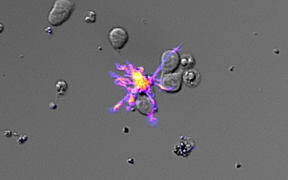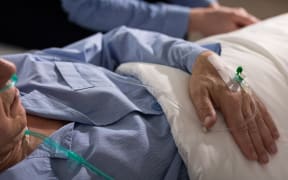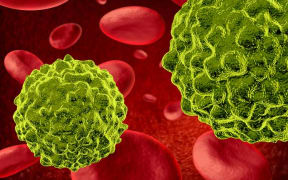Patients with a little-known cancer want a new treatment funded in this country, so they don't have to fly to Australia for life-saving care.

Photo: 123rf
One New Zealander a day is diagnosed with neuroendocrine cancer - about 300 a year.
It's often hard to diagnose, a process which may take up to five or six years.
The Apple founder, Steve Jobs, died five years ago of a condition related to a neuroendocrine tumour of his pancreas.
The tumours, known as NETs, occur in cells that carry messages from the brain to organs, making them do their job.
An Auckland heart specialist, Malcolm Legget, has NETs.
"These cells can produce various hormones like insulin or gastric acid or other hormones and sometimes they can become malignant and they can produce all sorts of weird and wonderful symptoms like flushing or asthma or abdominal paid."
Tumours were often found in the bowel or the lung, and sometimes could be removed surgically, curing the patient.
Those who are not cured with surgery, and have cancer that has spread, may be referred for specialist Peptide Receptor Radionuclide Therapy (PRRT), in Melbourne.
But that costs about $50,000 dollars, and cardiologist Mr Legget, who has had the treatment himself, said it needed to be available here.
"A number of New Zealanders are affected by this. Not everyone who gets diagnosed with NET cancer needs this but there are certainly a subset of patients who get a dramatic benefit from this treatment."
Wellingtonian Chris Holmes endured excruciating pain at times, and was told he needed palliative care, before finding out he had the cancer in his tail bone.
"I couldn't do anything but just lie down, you know, it was like really intense cramping. I mean it was pretty severe in the sense I'd have to just grind my way through it."
Mr Holmes used health insurance and the generosity of friends to receive treatment in Melbourne, and viewed himself as lucky.
"The cost of getting there is prohibitive for a lot of people, and the challenges of going there and going alone just make it untenable I suppose for a lot of people."
Another patient, Andrea, 61, has borrowed on her home for her upcoming treatment. "I only hope that the first four treatments are going to work. Anything else after that I don't know what I'll do but at this stage I'm hoping, really hoping, that I only need the four treatments."
Doctors and patients would all like the therapy to be available here, for those who need it.
Auckland medical oncologist Ben Lawrence said 20 to 30 patients a year could benefit, and face a difficult time without it.
But therapy for the tumours fell into a grey area in terms of funding approval, he said.
"Normally medicines that go all around the body ... are considered by [drug buyer] Pharmac, but because this is actually a radioactive substance, or a type of radiation treatment really, but targeted and delivered systemically, there's no mechanism for assessing the value of this type of therapy in the [Health] Ministry at the moment."
Specialists were discussing the situation with the ministry, Dr Lawrence said.
However, the ministry directed RNZ to Pharmac, saying the drug-buyer would consider a funding application but had not received one.
In a statement, the ministry added that Auckland University was leading a nationwide study into the causes of neuroendocrine cancer and planned to establish a national clinical framework for managing the tumours.







